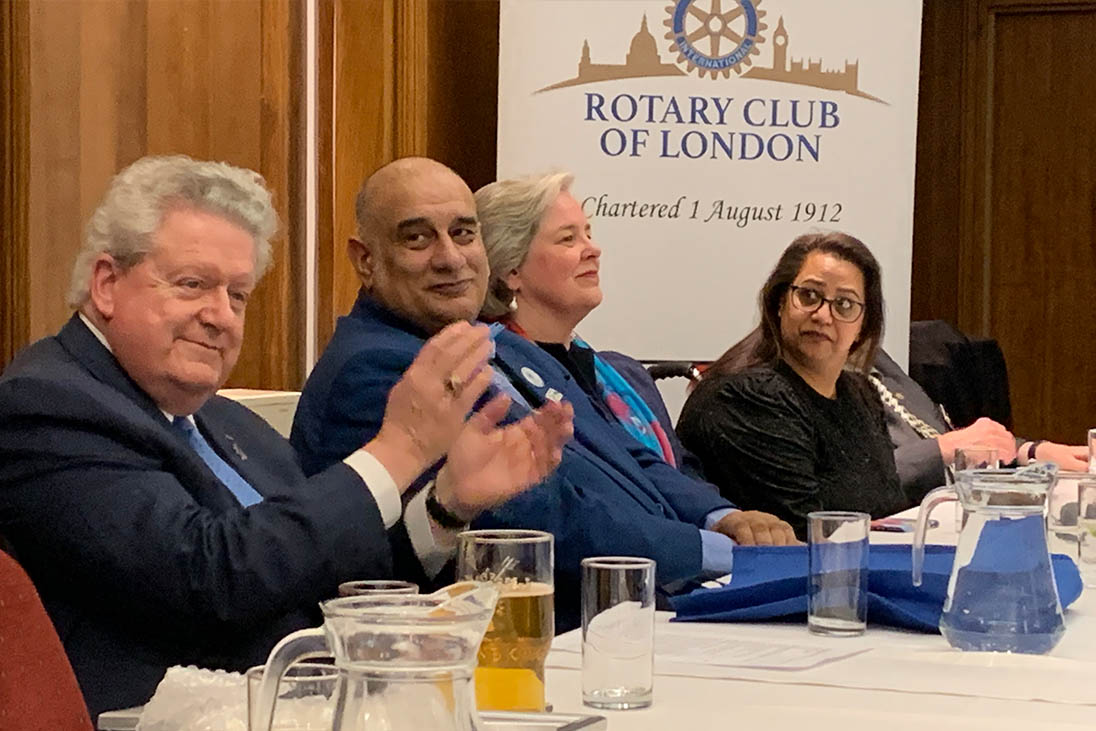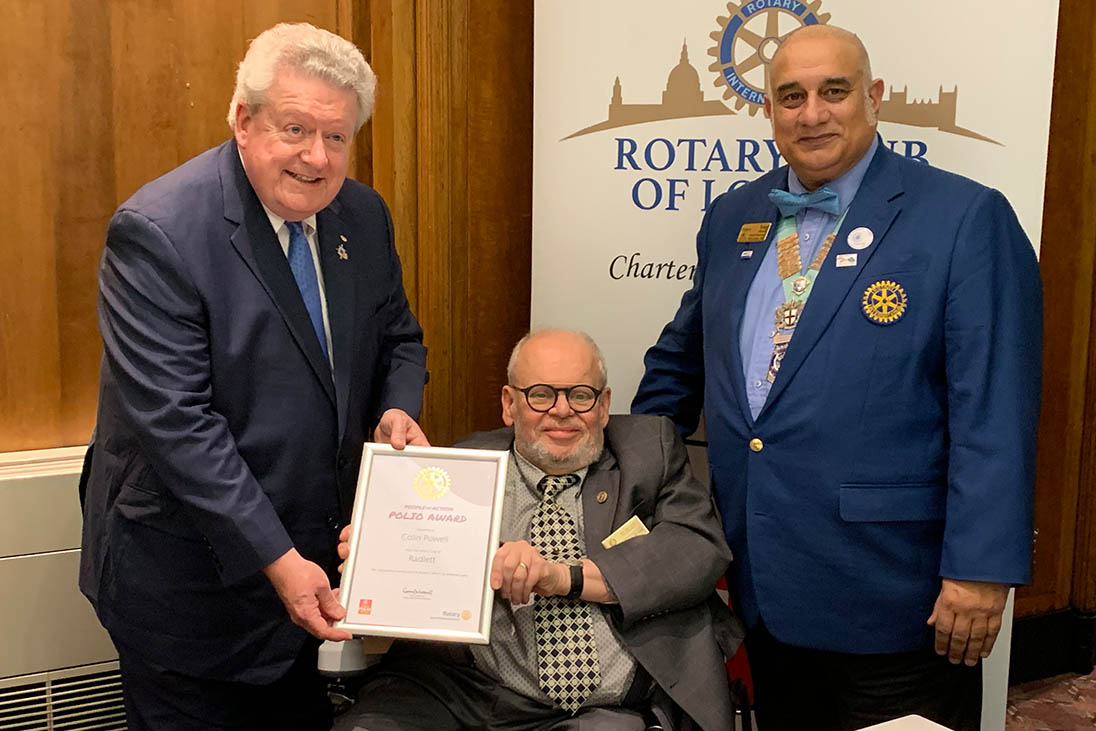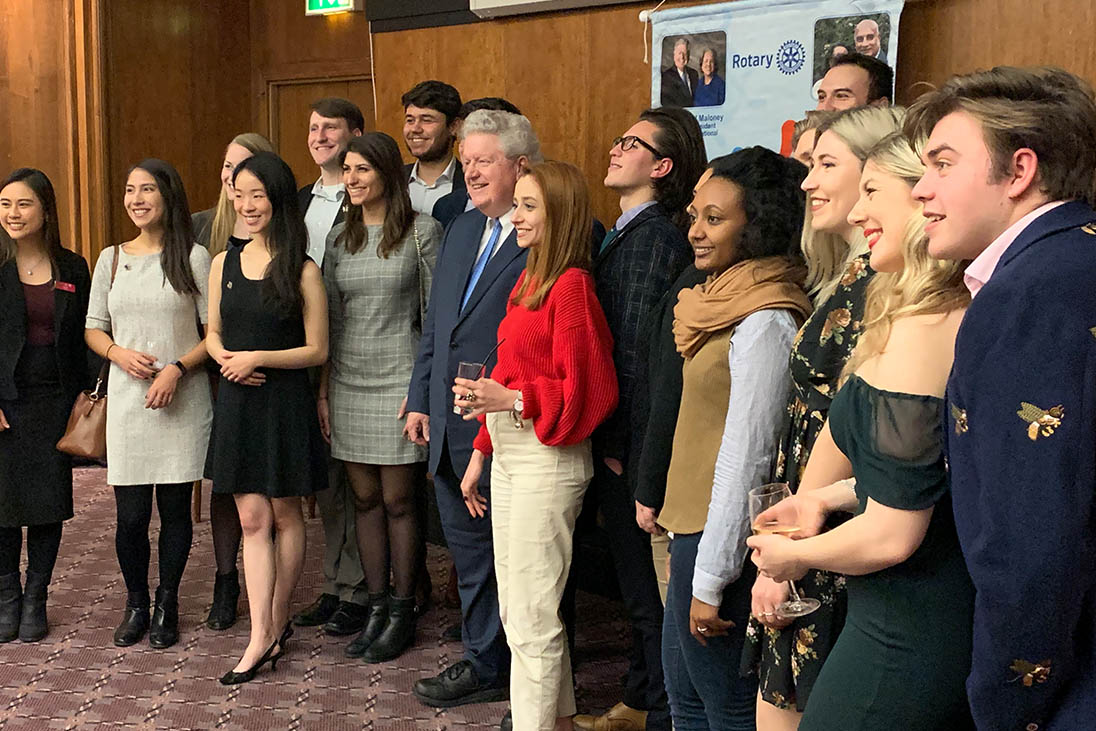Rotary International President, Mark Maloney, has urged clubs in Great Britain & Ireland to think differently in a bid to grow the organisation in these isles.
The Rotarian from Decatur in Alabama, flew into London with his wife Gay on Sunday from Zimbabwe, where they spent a week in Mutare with a team of doctors from India working at the St Joseph Mission Hospital.
The doctors were part of a Rotary Vocational Team from District 3080 in India whose work was made possible by a grant from the Rotary Foundation.
Mark and Gay are in London for four days, and today (Monday) they were attending the Commonwealth Service at Westminster Abbey.
On Sunday evening, the couple met Rotaractors and Rotarians from London at the Royal Overseas League in Mayfair.
Marking the start of World Rotaract Week, the Rotary International President spoke passionately about the need to embrace Rotaract as a catalyst for growth within the organisation.


Rotary International President, Mark Maloney, has urged clubs in Great Britain & Ireland to think differently in a bid to grow the organisation in these isles.
“We are living in interesting times – and not just with Covid-19,” he said. “We are moving into a new era.
“We estimate that 5% of Rotaractors convert to become Rotarians later on. That is why we are doing away with a maximum age limit, so they stay as Rotaractors and then they hopefully transition.
“We want every Rotaractor to join a Rotary club, or we want a Rotaract club to convert to a Rotary club, because we consider a Rotary club to be the premier experience.”
There are more than 1.2 million Rotarians worldwide and 35,000 clubs. Mark Maloney admitted there were still many countries in the world where Rotary was under-represented.
One potential growth area is China where, excluding Hong Kong, Macau and the Shenzhen economic area, there are currently 28 Rotary clubs in mainland China among a population of 1.38 billion.
“In China, there is potential,” insisted the Rotary International President. “We are not fully registered in China.
“The government has shown up at some meetings and we are in the middle of that process, but right now the Chinese Government is, understandably, not really focussed on our application.


He also paid tribute to polio campaigner, Colin Powell, from Radlett Rotary in Hertfordshire as he was presented with a People of Action award.
“But we have been in the process and they haven’t yet told us ‘no’. The Chinese Government recognises what Rotary is accomplishing.”
But Mark Maloney insisted that while Rotary is looking at growth in some previously untapped parts of the world, the emphasis was on clubs in Great Britain and Ireland to reach out to untapped parts of their communities.
“One of the key points of my year is that in the UK and the USA, and in those countries where Rotary is ‘mature’, we need to be forming new, innovative, different Rotary clubs,” he insisted. “Because we are not serving all the segments of society.”
There are more than 1.2 million Rotarians worldwide and 35,000 clubs. Mark Maloney admitted there were still many countries in the world where Rotary was under-represented”
Mark Maloney pointed out that some of Rotary’s traditions and long-practised ways of doing Rotary was deterring the younger generation from getting involved.
Meeting times were excluding some sectors of the community, the protocols and rituals were also a deterrent, as was the cost of a weekly meal.
“There are people who are interested in providing humanitarian service, but who don’t want to do it through a club which has this traditional, ritualistic way of operating,” he pointed out.
“There are people who also want to perform service, but they either cannot or will not pay what it takes to be a member.


At the London gathering, Mark Maloney welcomed the newest Rotaract club in Great Britain & Ireland, the Rotaract Club of London.
“So I submit that where we need to be expanding Rotary is not just in those countries which have one club or a few clubs, but in communities where Rotary is thriving, because we are not serving members of those communities.
“Rotary clubs today are not doing anything wrong. We have many communities where we have fabulous clubs, doing fantastic work. They still attract new members, they are not collapsing, but we have got to start to segmenting our approach.
“We need new, different, innovative Rotary clubs.
“Some people may find this shocking, but there is nothing in Rotary’s constitutional documents which says that food is required to have a meeting.
It may not be to everyone’s taste, but I guarantee there are younger people who would like to be a member of that Rotary club.”
“Neither is there anything which says that a programme has to happen in order to have a meeting.
“You can have a club that comes together in a bar twice a month for 45 minutes, for a little fellowship, a lot of project planning, which goes out and does great community service, and which will be a wonderful Rotary club.
“It may not be to everyone’s taste, but I guarantee there are younger people who would like to be a member of that Rotary club.”
At the London gathering, Mark Maloney welcomed the newest Rotaract club in Great Britain & Ireland, the Rotaract Club of London.
He also paid tribute to polio campaigner, Colin Powell, from Radlett Rotary in Hertfordshire as he was presented with a People of Action award.









